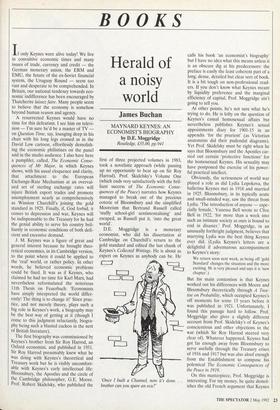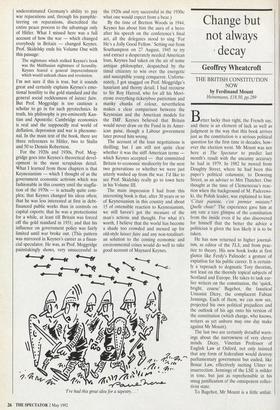BOOKS
Herald of a noisy world
James Buchan
MAYNARD KEYNES: AN ECONOMIST'S BIOGRAPHY by D.E. Moggridge Routledge, £35.00, pp.941 If only Keynes were alive today! We live in convulsive economic times and many issues of trade, currency and credit — the German monetary union, the ERM and EMU, the future of the ex-Soviet financial system, the Uruguay Round — seem too vast and desperate to be comprehended. In Britain, our national tendency towards eco- nomic indifference has been encouraged by Thatcherite laissez faire. Many people seem to believe that the economy is somehow beyond human reason and agency.
A resurrected Keynes would have no time for this defeatism. I see him on televi- sion — I'm sure he'd be a master of TV on Question Time, say, lounging deep in his chair with his long legs crossed as in the David Low cartoon, effortlessly demolish- ing the economic philistines on the panel and in the studio audience. I also have here a pamphlet, called, The Economic Conse- quences of Mr Major, in which Keynes shows, with his usual eloquence and clarity, that attachment to the European Exchange-Rate Mechanism at an overval- ued set of sterling exchange rates will injure British export trades and promote unemployment nearly as comprehensively as Winston Churchill's joining the gold standard in 1925. Finally, if, God forbid, it comes to depression and war, Keynes will be indispensable to the Treasury for he had the genial ability to serve his country bril- liantly in economic conditions of both defi- cient and excessive demand.
J. M. Keynes was a figure of great and general interest because he brought theo- retical economics, in its Cambridge version, to the point where it could be applied to the 'real' world, or rather policy. In other words, he believed economic problems could be fixed. It was as if Keynes, who claimed he had no time for Karl Marx, had nevertheless reformulated the notorious 1 1 th Thesis on Feuerbach: 'Economists have simply interpreted the world differ- ently! The thing is to change it!' Since prac- tice, and not merely theory, plays such a big role in Keynes's work, a biography may be the best way of getting at it (though I come to this judgment reluctantly, biogra- phy being such a blasted cuckoo in the nest of British literature).
The first biography was commissioned by Keynes's brother from Sir Roy Harrod, an Oxford economist, and published in 1951. Sir Roy Harrod presumably knew what he was doing with Keynes's theoretical and Treasury work but he is visibly uncomfort- able with Keynes's early intellectual life: Bloomsbury, the Apostles and the circle of the Cambridge philosopher, G.E. Moore. Prof. Robert Skidelsky, who published the first of three projected volumes in 1983, took a novelistic approach (while passing up no opportunity to beat up on Sir Roy Harrod). Prof. Skidelsky's Volume One (which ends very satisfactorily with the bril- liant success of The Economic Conse- quences of the Peace) narrates how Keynes managed to break out of the precious coterie of Bloomsbury and the simplified Mooreism that Bertrand Russell called `stuffy school-girl sentimentalising' and escaped, as Russell put it, 'into the great world'.
D.E. Moggridge is a monetary economist, who did his dissertation at Cambridge on Churchill's return to the gold standard and edited the last chunk of Keynes's Collected Writings. He is about as expert on Keynes as anybody can be. He 'Once 1 built a Chunnel, now it's brother can you spare an ecu?' done. . . calls his book 'an economist's biography' but I have no idea what this means unless it is an obscure dig at his predecessors: the preface is easily the least coherent part of a long, dense, detailed but clear sort of book. It is a bit tough on non-professional read- ers. If you don't know what Keynes meant by liquidity preference and the marginal efficiency of capital, Prof. Moggridge ain't going to tell you.
At other points, he's not sure what he's trying to do. He is lofty on the question of Keynes's casual homosexual affairs but nevertheless publishes Keynes's sexual appointments diary for 1901-15 in an appendix 'for the prurient' (as Victorian anatomists did their pudendal diagrams). Yet Prof. Skidelsky must be right when he says that Bloomsbury and the Apostles car- ried out certain `protective functions' for the homosexual Keynes. His sexuality may have postponed the exercise of his power- ful practical intellect.
Obviously, the seriousness of world war played a role as did Lydia Lopokova, the ballerina Keynes met in 1918 and married in 1925. Bloomsbury, in its typically acute and small-minded way, saw the threat from Lydia. 'The introduction of anyone — espe- cially female,' Vanessa Bell wrote to Clive Bell in 1922, 'for more than a week into such an intimate society as ours is bound to end in disaster.' Prof. Moggridge, in an unusually forthright judgment, believes that marrying Lydia was the best thing Keynes ever did. (Lydia Keynes's letters are a delightful if adventurous accompaniment to Keynes's story: We return soon next week, as being off 'gold Standard' changes the situation and the more exciting. M. is very pleased and says it is 'new chapter'.)
But his main contention is that Keynes worked out his differences with Moore and Bloomsbury theoretically through A Trea- tise on Probability, which occupied Keynes's off moments for some 15 years before it was published in 1921. Unfortunately, I found this passage hard to follow. Prof. Moggridge also gives a slightly different account from Prof. Skidelsky's of Keynes's conscientious and other objections to the war (which Sir Roy Harrod steered very clear of). Whatever happened, Keynes had got far enough away from Bloomsbury to serve usefully through the Treasury crises of 1916 and 1917 but was also aloof enough from the Establishment to compose his polemical The Economic Consequences of the Peace in 1919.
On this masterpiece, Prof. Moggridge is interesting. For my money, he quite demol- ishes the old French argument that Keynes underestimated Germany's ability to pay war reparations and, through his pamphle- teering on reparations, discredited the entire peace process to the advantage only of Hitler. What I missed here was a full account of how the war — which changed everybody in Britain — changed Keynes. Prof. Skidelsky ends his Volume One with this passage:
The nightmare which stalked Keynes's book was the Malthusian nightmare of fecundity. Keynes feared a general impoverishment which would unleash chaos and revolution.
I'm not sure if this is true, but it sounds great and certainly explains Keynes's emo- tional hostility to the gold standard and the general social recklessness of laissez faire. But Prof. Moggridge is too cautious a scholar to go in for such pyrotechnics. In truth, his philosophy is pre-eminently Kan- tian and Apostolic: Cambridge economics is real and the supposedly real world of deflation, depression and war is phenome- nal. In the main text of the book, there are three references to Hitler, two to Stalin and 50 to Dennis Robertson.
For the 1920s and 1930s, Prof. Mog- gridge goes into Keynes's theoretical devel- opment in the most scrupulous detail. What I learned from these chapters is that Keynesianism — which I thought of as the government economic activism which was fashionable in this country until the stagfla- tion of the 1970s — is actually quite com- plex; that Keynes changed his ideas often; that he was less interested at first in debt- financed public works than in controls on capital exports; that he was a protectionist for a while, at least till Britain was forced off the gold standard in 1931; and that his influence on government policy was fairly limited until war broke out. (This pattern was mirrored in Keynes's career as a finan- cial speculator. He was, as Prof. Moggridge painstakingly shows, very unsuccessful in
the 1920s and very successful in the 1930s: what one would expect from a bear.)
By the time of Bretton Woods in 1944, Keynes has about him the aura of a hero: after his speech on the conference's final act, all the delegates stood to sing 'For He's a Jolly Good Fellow.' Setting out from Southampton on 27 August, 1945 to try and extract a desperately needed American loan, Keynes had taken on the air of some antique philosopher, despatched by the timid citizenry to win over the energetic and susceptible young conqueror. Unfortu- nately, I got snagged on Prof. Moggridge's luxuriant and thorny detail. I had recourse to Sir Roy Harrod, who for all his Movi- etone everything-ticketyboo patriotism and manky chunks of colour, nevertheless makes a clear comparison between the Keynesian and the American models for the IMF. Keynes believed that Britain would never draw on the Fund in its Amer- ican guise, though a Labour government later proved him wrong.
The account of the loan negotiations is thrilling; but I am still not quite clear whether it was the stiff American terms which Keynes accepted — that committed Britain to economic mediocrity for the next two generations or whether we were just utterly washed up from the war. I'd like to see Prof. Skidelsky really go to town here in his Volume III.
The main impression I had from this interesting book is that, after 30 years or so of Keynesianism in this country and about 15 of ostensible reaction to Keynesianism, we still haven't got the measure of the man's actions and thought. For what it's worth, I believe that the world has become a shade too crowded and messed up for old-style laissez faire and any non-totalitari- an solution to the coming economic and environmental crises would do well to take good account of Maynard Keynes.
had this great idea for a tapestty. . .'
'I've



















































 Previous page
Previous page